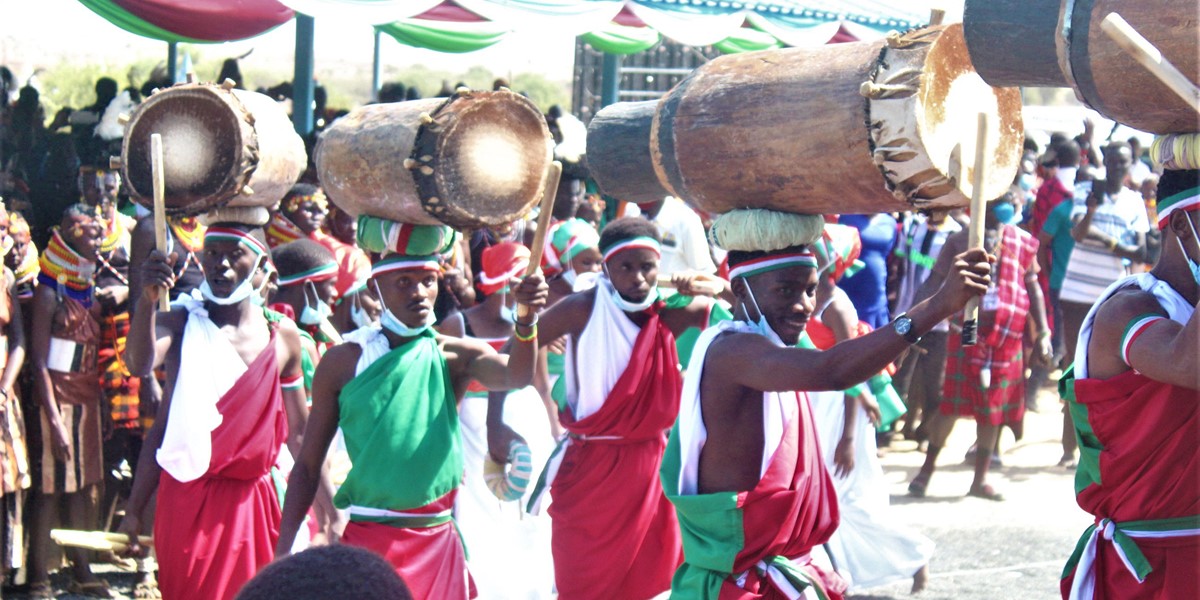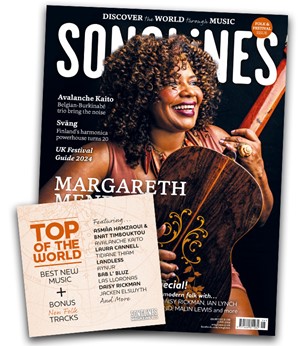Tuesday, August 16, 2022
Making music in Kenya’s Kakuma Refugee Camp
By Mark LeVine
Kakuma Sound’s co-founder reports from one of the world’s largest refugee camps, an inspirational musical wellspring for social change

Burundian drummers from Kakuma performing at the Lake Turkana Cultural Festival
With nearly 200,000 inhabitants, Kenya’s Kakuma Refugee Camp is one of the world’s largest. Established in 1992, it quickly became home to people fleeing violence across the Great Lakes and East Africa – including thousands of musicians.
For sub-Saharan African societies music is a primary language through which culture is transmitted across generations.
But when you have literally minutes to flee heavily armed attackers even the most dedicated musician will leave behind ceremonial drums, bow harps, thumb pianos or flutes.
A decade before Kakuma’s establishment, the Royal Drummers of Burundi took the newly created world music scene by storm with their performance at the first WOMAD.
Since their global debut, Burundi, like many of the countries of the Great Lakes region, has suffered through continual political conflict, and a civil war that killed over 300,000 people.
An attempted coup in 2015 sent some of the country’s greatest drummers and drum-makers into exile, with some ending up at Kakuma.
Four years later master drummers Omer Nzoyisaba and Pascal Niyonzima would agree not only to make the drums for their compatriots in Kakuma, but to transport them there and train local musicians.
Unfortunately, COVID-19 intervened; Kakuma closed to outsiders, and the region went into lockdown.
And so the odyssey of the Burundian royal drums, made by exiles for refugees, began.

It took acts of inordinate kindness, solidarity and luck to get the drums across three borders, on at least four trucks, before they arrived in Kakuma eight days after leaving Kigali.
The drums’ odyssey was the result of Kakuma Sound, an initiative we started in 2019, after a young boy rolled a rusted oil drum with a torn cowhide head down the dirt road where we were standing.
Following him to a group of Burundian musicians, we realised a rusted oil drum could, however tenuously, be played as a drum.
But for Ugandan, Congolese, Sudanese, Somali, and other traditional musicians, creating makeshift versions of far more complex instruments – without which their communal heritage, histories and even futures, were in danger of disappearing – was nearly impossible.
Epitomising the refugee experience, the past couldn’t be preserved nor the future composed.
They would remain in a cultural limbo that tragically reflected the political limbo of their refugee status.
The lack of instruments “has led us to lose our culture… we can’t maintain the musical traditions,” as one elder put it.
Once the idea of Kakuma Sound circulated in the camp, what began as several dozen musicians coming together to create a list of missing instruments quickly grew into a community-based organisation with over 200 members and dozens of groups working together to build a thriving traditional music scene in Kakuma.
As one young Nuer woman explained after a weekend training: “I’d never met people from the other communities. Now we come together and learn about instruments and music we never saw before.”
A young Ugandan man put it even more strongly, declaring that the traditional music has now become “the sound of social change in diverse communities in the camp.”
One of the Ugandan trainers who visited the camp late last year was equally impressed: “I have seen how the music can harmonise the communities, and give the world a new view of the camp.”

Today Kakuma’s musical landscape has completely changed.
There are upwards of 20 South Sudanese groups sharing instruments, half a dozen Congolese groups, two Ugandan ones and more forming among the various communities.
The sound of rehearsing is a daily occurrence; on any given weekend half a dozen or more performances might be occurring across Kakuma’s five sprawling neighbourhoods.
The Burundian drummers have performed outside the camp, including at the annual Lake Turkana Cultural Festival in Lodwar, which is a major development for musicians who usually aren’t allowed to travel any farther than the town of Kakuma.
Groups are also able to perform at important communal events such as weddings, funerals and ceremonies, and so reflect and pass on cultural heritage and knowledge.
And as musicians from across the camp come together to jam, new stylistic hybrids are beginning to emerge, attracting the attention of well-known artists from Kenya, South Sudan and beyond.
As leading Kenyan singer-songwriter Eric Wainaina says, “Kakuma’s music is like the cradle of humanity all over again.”
Indeed, many accounts regard Turkana as the literal cradle of humanity, so it’s fitting UNESCO is partnering with Kakuma Sound to expand the project into camps across the continent.
With the fuller integration of Kakuma into the surrounding community, musicians are looking to put it on the global music map as a hub of creativity, innovation and collaboration, enabling their music to open doors that have for too long been closed to traditional artists, and most refugees.
This article originally appeared in the July 2022 issue of Songlines. Never miss an issue – subscribe today
Find out more: kakumasound.wordpress.com

